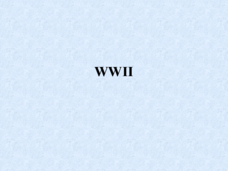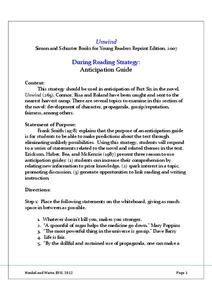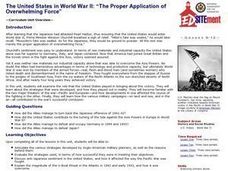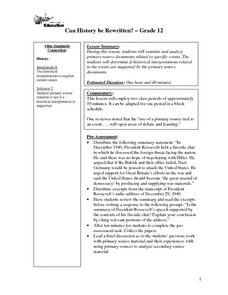Curated OER
World War II
Offering a comprehensive overview of the beginning of World War II, this resource could be a useful addition to a unit on this topic. It could be used as a way to lead a discussion on the war, or as a review tool before a test. Either...
Curated OER
WWII
As a review of information learned about Word War II, this would be a great resource. In a format using pictures, diagrams and lists of information, the presentation provides a look at the key topics. Both visually attractive and...
Curated OER
Unwind: Anticipation Guide
After responding to a series of prompts on an anticipation guide, readers of Unwind craft five predictions about what will happen in Neal Shusterman's young adult science fiction novel.
Anne Frank House
Who Was Anne Frank?
Set the stage for a study of The Diary of a Young Girl with a resource that includes background information about Anne Frank's early years, the Nazi invasion of the Netherlands, her Secret Annex hiding place, and her capture and...
Curated OER
The U.S. Holocaust Memorial Museum
Ninth graders visit the US Holocaust Museum to witness the actions of the Nazis against the Jews during World War II. A great lesson if you are located near the museum or are planning a trip to the DC area.
Curated OER
Dr. Seuss and Universal Themes
Discover some of the themes of Dr. Seuss's major books. They see that despite being written for young people, Dr. Seuss' books contain powerful messages and important themes.
Curated OER
"The Proper Application of Overwhelming Force": The United States in World War II
Students examine the role that the U.S. played in bringing about victory in the two major theaters of the war in the Pacific and Europe. How the various military campaigns contributed to the war's successful conclusion forms the focus of...
Curated OER
The Origins of the Cold War, 1945-1949
Students investigate the early years of the Cold War and the origins of containment. Both supporters as well as critics are probed to examine the differences that emerged in the months following the end of the war in Europe. This unit...
Curated OER
Ages in Stages: An Exploration of the Life Cycle based on Erik Erikson's Eight Stages of Human Development
Examine Erikson's chart on the various stages one goes through growing up. Individually, they write a paper on whether or not they fit into those categories and how they are different today. In groups, for each stage they role play the...
Curated OER
Can History Be Rewritten?
Can history be rewritten? Or, more precisely, is history documented accurately? High school juniors and seniors compare primary source material with secondary sources. For example, they compare President Roosevelt's December 29, 1940...
Curated OER
Leaders, Laborers, and Other Perspectives of World War II
How did the women in France feel about their country’s involvement in World War II? Class groups are assigned a country involved in WWII, and individuals within the group adopt the point of view of leaders, laborers, businessmen, women,...
Curated OER
Die Weisse Rose: German History
Students conduct research on a German anti-Nazi group named "Die Weisse Rose", the White Rose, that eventually lost their lives for their resistance to Nazi rule. They view films, access the Internet, prepare responsive narratives to the...
Curated OER
Animal Farm: Propaganda
Eighth graders study the concept of propaganda and its major techniques. they define propaganda; analyze use of techniques in AF; create own propaganda using common techniques on a current topic.
Curated OER
Compare And Contrast-- People of Eminence
In this social studies worksheet, learners are directed to a Web site to read about famous people. Students choose 2 people and use a Venn diagram to compare and contrast. Learners then investigate the difference between being "famous"...
Curated OER
Sunken Millions for People in our Past
This multiple choice review covers famous historical figures from all walks of life. each slide has a scoring set up in the corner which assumes two teams and allows for hints and lifelines etc. but it is not clear how to use this...
The New York Times
'The Century's Bitterest Journalistic Failure'? Considering Times Coverage of the Holocaust
Rich with primary sources and additional resources, this plan asks class members to think critically about newspaper coverage of the Holocaust. Focusing in particular on the analysis of the article "150th Anniversary: 1851-2001: Turning...
Louisiana History Teachers
If You Give Napoleon a Cookie...
What fun! To illustrate the concept of appeasement, class members use Napoleon's exploits as the basis of their own illustrated children's book modeled after Laura Numeroff's circular tale, If You Give a Mouse A Cookie. What fun!
Facing History and Ourselves
Do You Take the Oath?
Why did so many go along with Nazi policies during World War II? An investigatory unit includes four handouts, reading analyses, classroom discussion topics, and intriguing philosophical questions, helping learners understand the...
US Holocaust Museum
Remember the Children: Daniel’s Story
Imagine being a child forced from your home and into a concentration camp during World War II. Scholars prepare for a visit to the United States Holocaust Museum by researching the children of the horrible event. They analyze...
US Holocaust Museum
Life in Shadows: Hidden Children and the Holocaust
Hiding in the filth of a sewer, as a child, to avoid capture by Nazi soldiers—sounds scary! Scholars investigate the youngest victims of the Holocaust, the children. They research video clips and written sources from the Holocaust...
Curated OER
The Mythology of Munich
Students listen to a story read by their teacher and identify the pictures inside it to be real or make believe. For this fiction and non fiction lesson plan, students also write a real or make believe story of their own.
Curated OER
Firestorms: The Bombing of Civilians in World War II: War, Ethics, Guernica, Precision Bombing
Pupils explore the history, rationale and ethics of civilian bombing in times of war. They consider war strategy, the laws and conventions of war and international implications.
Curated OER
Rethinking Perpetrators, Bystanders and Rescuers: The Case of Max Schmeling
The focus of this lesson is personal choice and how changing circumstances can affect one person's ethical choices. During the Holocaust, people made choices, and by placing individuals in the appropriate historical context students can...
Other popular searches
- Adolf Hitler
- Hitler Youth
- Rise of Hitler
- Hitler, Adolph
- Reader's Theater Hitler
- Stalin Hitler Mussolini
- Hitler & the Holocaust
- Fascism Hitler
- Hitler and the Jews
- The Rise of Hitler
- Hitler and Nazi Party
- Adolf Hitler Powerpoint

























